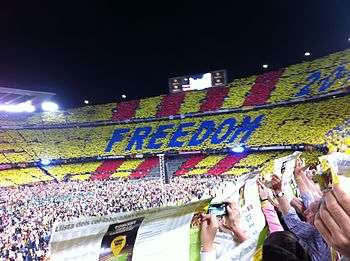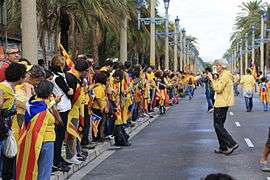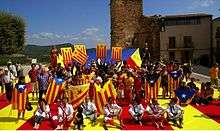Assemblea Nacional Catalana
The Assemblea Nacional Catalana ("Catalan National Assembly"; ANC) is an organization that seeks the political independence of Catalonia from Spain through the establishment of a free and democratic State. It also promotes irredentistic claims to the Catalan Countries.[1]
Its current president is Jordi Sànchez i Picanyol. In January 2015, it had more than 80,000 members, of which 40,132 were full-paying members (fee paying) and 39,946 were signed up as volunteer collaborators.[2] It has 10 regional subdivisions which are represented on the national board as well as professional sectorial groups and 37 foreign branches around the world.[3]
History
The origin of the organization was the National Conference for the Catalan State (Conferència Nacional per l'Estat Propi), held on April 30, 2011 in Barcelona, in which 1,500 people participated. A Permanent Council was elected at this conference, including Aureli Argemí, Enric I. Canela, Carles Castellanos, Josep Cruanyes, Josep Dalmau, Miquel Esquirol, Patrícia Gabancho, Julià de Jòdar, Joel Joan, Enric Larreula, Lluís Llach, Josep Maria Murià, Ferran Requejo, Francesc Ribera, Pep Riera, Blanca Serra, Eva Serra, Jordi Solé, Josep Maria Terricabras, Quim Torra, Ricard Torrents, among others. Moreover, the interim secretariat was also elected, which was composed of Alfred Bosch, Miquel Strubell, Miquel Sellarès, Jaume Soler, among others.[4][5]
The formal incorporation as a civic association was held on March 10, 2012 at the Palau Sant Jordi in Barcelona.[6][7] in which the statutes, internal workings, and road map to independence were approved. In April 2012, Carme Forcadell was chosen as President of the ANC, while Carles Castellanos was elected vice-president, Llorenç Sotorres was treasurer, and Jordi Martínez was elected secretary.
On September 11, 2012 a demonstration in favor of independence organized by the Catalan National Assembly took place in Barcelona with 1.5 million participants.[8] It is the biggest demonstration that has ever taken place in Barcelona.
On June 8, 2013, the ANC held elections in which Carme Forcadell was re-elected president. Jaume Marfany was elected vicepresident, substituting Carles Castellanos, Jordi Martínez remained as secretary and Oriol Sallas replaced Llorenç Sotorres as treasurer.
Campaigns and activity
The regional chapters of the ANC periodically organize a series of events in their respective areas with respect to the independence of Catalonia in preparation for the Catalonian independence referendum in 2014.
September 11, 2012
At the end of June, 2012, the "March toward Independence" was begun in Seu Vella (Lleida). This march would culminate on September 11 with a massive march on Barcelona, with the slogan "Catalonia, new state in Europe", after a series of festive, symbolic, and protest events all over the territory. It was a historic day, both for the number of people in attendance as well as the markedly pro-independence tone of the march, never before seen in such a well-attended event. The participation in the march was remarkable, and estimates of the crowds range from 1.5 million according to the City Police and Ministry of the Interior, to 2 million according to the organizers of the event. Despite those figures, the delegation of the Spanish government in Catalonia later offered lower participation numbers of 600,000 people.
Two days after the demonstration, the president of the ANC, Carme Forcadell, and four additional members of the group's board—Blanca Serra, Soledat Balaguer, Marc Ricart and Richard Gené—were officially received at the Catalan Government Palace by President Artur Mas, with whom they met for more than an hour. During the meeting, they suggested to him that he convoke plebescitary elections to the Parliament of Catalonia on independence and that he call for a referendum in 2014.
The following week, in a meeting between the President of the Catalan Government, Artur Mas, and the Prime Minister of Spain, Mariano Rajoy, the clear disagreement between the two leaders was made quite clear. Rajoy reiterated to Mas his refusal to discuss Mas' proposal of a Fiscal Pact for Catalonia, thereby breaking off negotiations between the two governments. The falling out between Mas and Rajoy also resulted in the loss of parliamentary support that Convergència i Unió has obtained from the Partit Popular de Catalunya during the legislature, which left the government in a minority position, unable to approve the budget.
Mas convoked snap elections the Catalan Parliament for November 25, 2012 and made clear in his speech in the inaugural session of the General Policy Debates that he was convinced that the Parliament that came out of the new elections would have as its mission the exercise of the right to self-determination of Catalonia.
2013

At the beginning of 2013, the ANC began a Fiscal Sovereignty campaign so that private citizens, businesses, and local institutions could pay taxes en masse to the Catalan Tax Agency. From May to July, 2013, they organized a crowdfunding campaign at totSuma in order to offer support to all the interested parties.
On June 1, 2013, the ANC began the "Sign a vote for independence" campaign, in which, through the right to petition, votes are collected to ask the Catalan Parliament to exhaust all of the possible paths toward facilitating the celebration of a referendum for self-determination of Catalonia before May 31, 2014, and in the event that that attempt fails because the Spanish Government will not authorize a referendum or will not accept the results of a referendum, that the elected representatives of the people of Catalonia unilaterally declare the independence of Catalonia.

The Catalan National Assembly and Òmnium Cultural organized a concert, the Concert for Freedom, in Camp Nou on June 29, 2013 to show off the massive community support in favor of independence. Around 90,000 people attended the concert and among the performers were Lluís Llach, Sopa de Cabra,Miquel Gil, Pastora, Joana Serrat, Jofre Bardagí, Jordi Batiste, Lídia Pujol, Xavi Sarrià i Miquel Gil, Maria del Mar Bonet, Marina Rossell, Mayte Martín, Mercedes Peón, Mouss & Hakim, Nena Venetsanou, l'Orfeó Català, Paco Ibáñez, Pascal Comelade, Pep Sala, Pere Jou de Quart Primera, Peret, Projecte Mut, Quico Pi de la Serra, Sabor de Gràcia, Titot and David Rosell, among others.
The Catalan Assembly also organized a human chain of about 400 km in length, known as the Catalan Way, that was held on the National Day of Catalonia (September 11) and which followed the path of the old Via Augusta (or Augustan Road), from La Jonquera (in the north of Catalonia) to Alcanar (in the south). It was inspired by the Baltic Way, which was organized by Baltic political movements seeking independence from the Soviet Union in 1989 and spanned the three Baltic states of Estonian SSR, Latvian SSR, and Lithuanian SSR. Between 1.6 and 2 million citizens held their hands along these 400 km. After such a huge success, Catalan President Artur Mas received Mrs. Forcadell at the Government Palace, Palau de la Generalitat, and committed to listen to the will of the people and to organising a consultation on the region's future.
2014
On May 29, 2014, the ANC, with other associations, presented at "El Born", the campaign "El País que Volem" (The Country we Want), an open participative process for citizens whose goal is to collect their proposals about how should Catalonia be when it becomes an independent state.[9]
The Catalan Assembly and Òmnium Cultural organized the demonstration of the September 11 in Barcelona. This Demonstration formed a huge Catalan flag all along 11 kilometers between Gran Via de les Corts Catalanes and Diagonal avenue forming a big "V" for will ("voluntat"), voting and victory. According to police there were 1.8 million and according to organizations 2.5 million people to demand for a poll on the 9th of November, 2014. [10]
On September 14 the Catalan Assembly gave to the parliament president, Núria de Gispert, nearly 750.000 signatures (inside 234 carton boxes) collected in the campaign "Sign a vote for independence", to ask Catalan government to declare independence if the November 9 poll could not be held.[11]
See also
| Wikimedia Commons has media related to Assemblea Nacional Catalana. |
References
- ↑ "Les coincidències i discrepàncies dels fulls de ruta cap a la independència". Vilaweb (in Catalan). 26 March 2015.
- ↑ "L'ANC ja té 51.000 adherits, el doble de fa un any". Vilaweb (in Catalan). 5 April 2014.
- ↑ http://catalanassembly.org/foreign-assemblies/
- ↑ La Conferència per l'Estat Propi inicia la ruta sobiranista, El Punt.
- ↑ Consens i unitat per impulsar l'Assemblea Nacional Catalana, Llibertat.
- ↑ Neix oficialment l'Assemblea Nacional de Catalunya per traçar el camí cap a la independència, Ara.
- ↑ Neix l'Assemblea Nacional Catalana amb l'objectiu de promoure un referèndum per la independència el 2014, 324.
- ↑ http://www.nytimes.com/2012/09/12/world/europe/12iht-barcelona12.html?_r=0
- ↑ El País que Volem' neix perquè ciutadans i entitats dibuixin la Catalunya independent (in Catalan). Diari Ara. 2014-05-29. Retrieved 2014-06-09.
- ↑ "1,8 milions de catalans reclamen votar amb una històrica V a Barcelona". elpuntavui.cat (in Catalan). Retrieved 2014-09-14.
- ↑ "L'ANC entrega 750.000 signatures per l'estat propi". ara.cat (in Catalan). Retrieved 2014-09-15.
External links
- Assemblea Nacional Catalana (Catalan)
- Catalan National Assembly (English)
